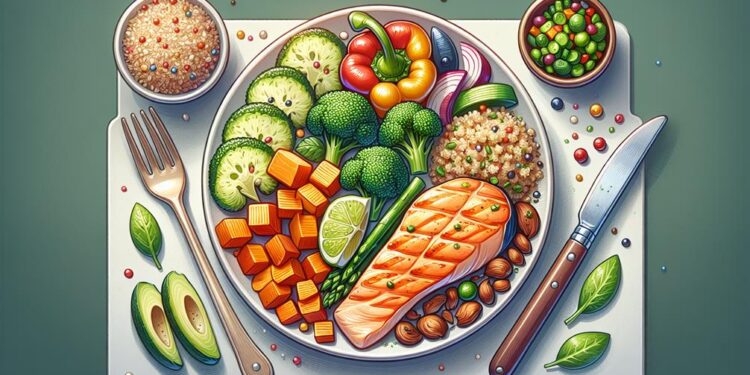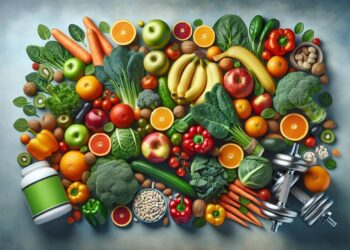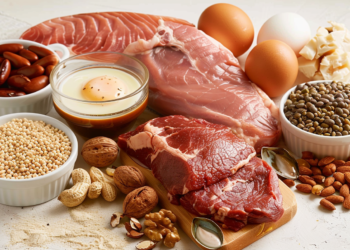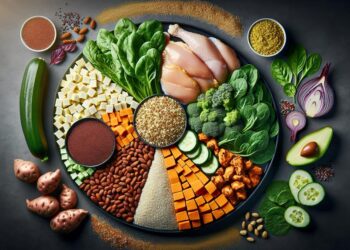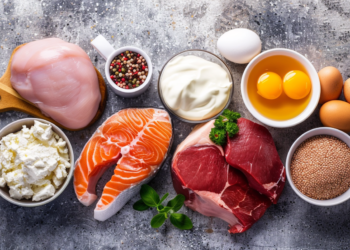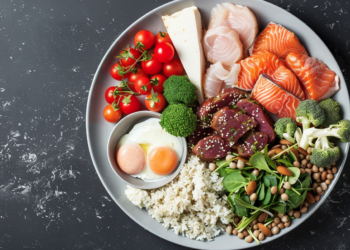Targeting key nutrients like protein, carbohydrates, and BCAAs is crucial for effective muscle-building diets, but there’s more to uncover for optimal results.
To build muscle effectively, key nutrients are essential. Protein, found in lean meats and legumes, aids muscle growth and repair. Carbohydrates from fruits and whole grains provide energy for workouts. Healthy fats like olive oil support muscle development. BCAAs enhance protein synthesis and reduce soreness. Creatine boosts strength and power output. Vitamin D from sunlight and foods like fatty fish are necessary for muscle strength. Iron aids oxygen transport, while zinc is critical for protein synthesis. Magnesium aids in recovery and muscle function. Water is critical for performance and nutrient transport. Essential knowledge for your muscle-building journey.
Key Takeaways
- Protein supports muscle growth and repair.
- Carbohydrates provide energy for workouts.
- Healthy fats aid in muscle development and recovery.
- BCAAs enhance muscle protein synthesis.
- Adequate hydration is crucial for muscle function.
Protein
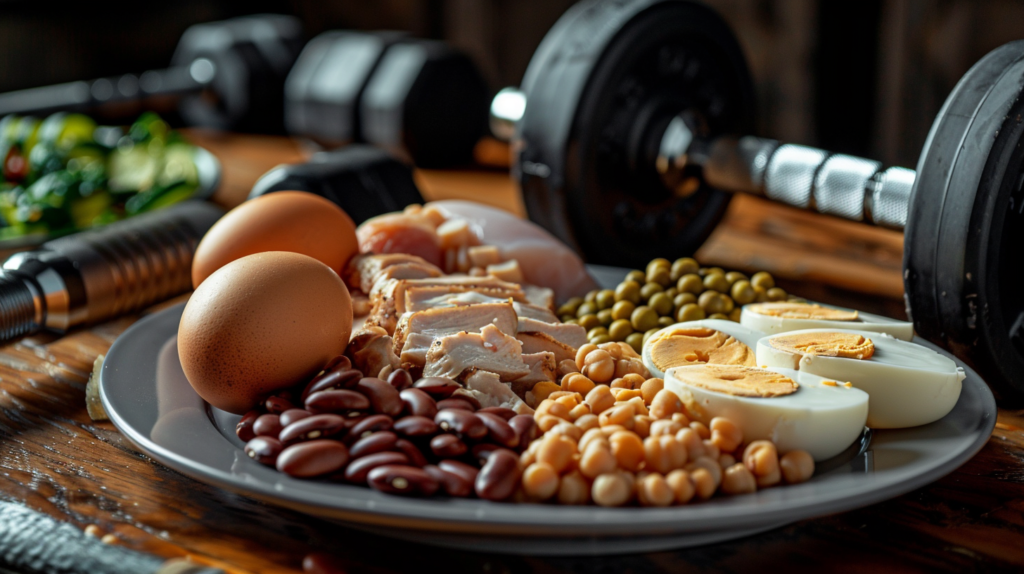
When it comes to muscle-building diets, protein plays a significant role in providing the necessary building blocks for muscle growth and repair. Protein sources are essential to take into account when aiming to maximize muscle growth. High-quality protein sources such as lean meats, poultry, fish, eggs, dairy products, legumes, nuts, and seeds are rich in essential amino acids that support muscle protein synthesis. Including a variety of these protein sources in your diet ensures that your body has access to all the necessary amino acids for muscle repair and growth.
Protein timing is another important aspect to take into consideration in muscle-building diets. Consuming an adequate amount of protein throughout the day, especially post-workout, can enhance muscle protein synthesis and facilitate recovery. Research suggests that consuming protein-rich meals or snacks within 30 minutes to two hours after exercise can promote muscle repair and growth. This post-workout window is when your muscles are highly receptive to protein, making it a prime time to refuel and kickstart the recovery process.
In addition to post-workout protein intake, spreading protein consumption evenly throughout the day can also be advantageous for muscle growth. This approach ensures a steady supply of amino acids for muscle repair and maintenance. By strategically incorporating protein sources into your meals and snacks, you can support your muscle-building goals and optimize your overall performance. Remember, protein isn’t only essential for muscle growth but also plays a critical role in supporting various bodily functions, making it an essential nutrient in any muscle-building diet plan.
Carbohydrates
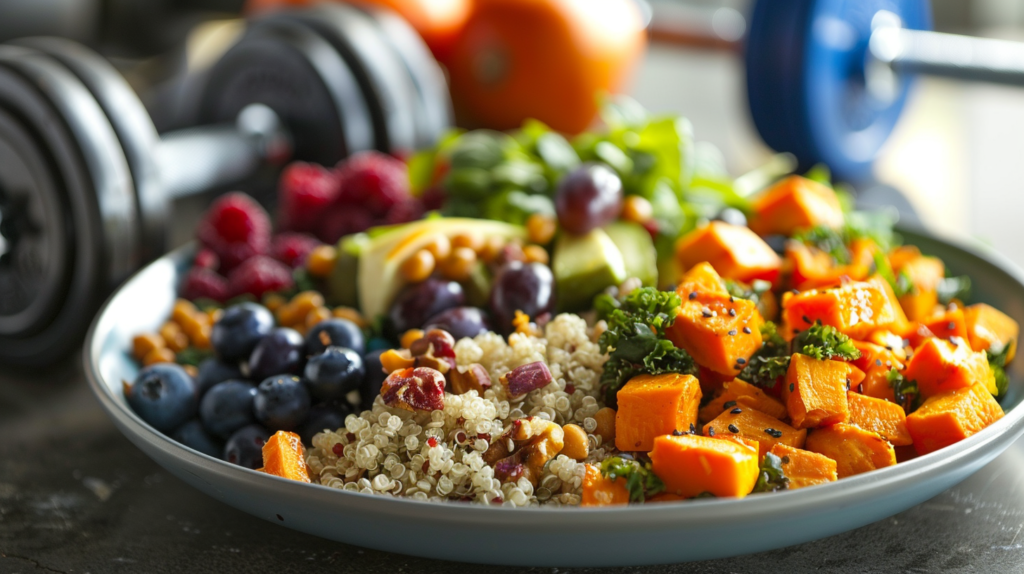
Carbohydrates are an essential macronutrient that provides energy for physical activity and supports muscle recovery and growth in muscle-building diets. As a primary energy source, carbohydrates fuel our muscles during high-intensity workouts, making them vital for performance enhancement. When consumed, carbohydrates are broken down into glucose, which is then converted into glycogen and stored in muscles and the liver. This stored glycogen acts as a reserve that can be quickly accessed during exercise, delaying muscle fatigue and allowing for prolonged physical exertion.
In muscle-building diets, carbohydrates play a critical role in glycogen replenishment post-workout. After intense training sessions, glycogen stores become depleted, and consuming carbohydrates helps restore these levels, promoting faster recovery and muscle repair. Additionally, carbohydrates stimulate the release of insulin, a hormone that aids in transporting amino acids into muscle cells for protein synthesis, further supporting muscle growth.
It’s important to choose complex carbohydrates like whole grains, fruits, vegetables, and legumes over simple sugars for sustained energy levels and overall health benefits. These nutrient-dense sources provide fiber, vitamins, and minerals along with carbohydrates, offering a more complete nutritional profile for muscle-building diets. By incorporating the right balance of carbohydrates into our meals, we can optimize our energy levels, support muscle fueling, and promote efficient recovery processes essential for muscle growth and development.
Healthy Fats
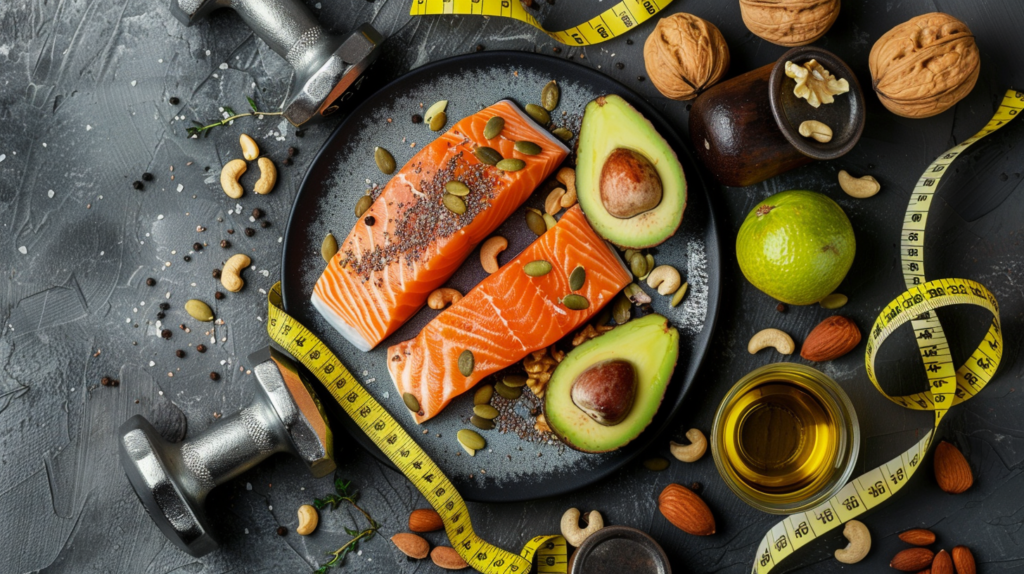
Incorporating healthy fats into musclebuilding diets is essential for optimizing performance and supporting overall muscle development and recovery. When it comes to healthy fats, cooking oils play an important role in providing the body with essential fatty acids, such as omega-3 and omega-6, which are important for reducing inflammation and enhancing muscle growth. Opt for healthier options like olive oil, coconut oil, or avocado oil when cooking to reap the benefits of these heart-healthy fats.
Nut butter is another excellent source of healthy fats that can be easily incorporated into muscle-building meal plans. Whether it’s almond butter, peanut butter, or cashew butter, these spreads offer a good dose of monounsaturated fats and protein, which are essential for muscle repair and growth. Spread nut butter on whole grain toast, mix it into smoothies, or simply enjoy it by the spoonful for a quick and nutritious energy boost.
Including a variety of healthy fats in your muscle-building diet not only supports overall health but also aids in optimizing workout performance and recovery. Remember that moderation is key when consuming fats, so be mindful of portion sizes to make sure you’re getting the right balance of nutrients for your fitness goals.
BCAAs
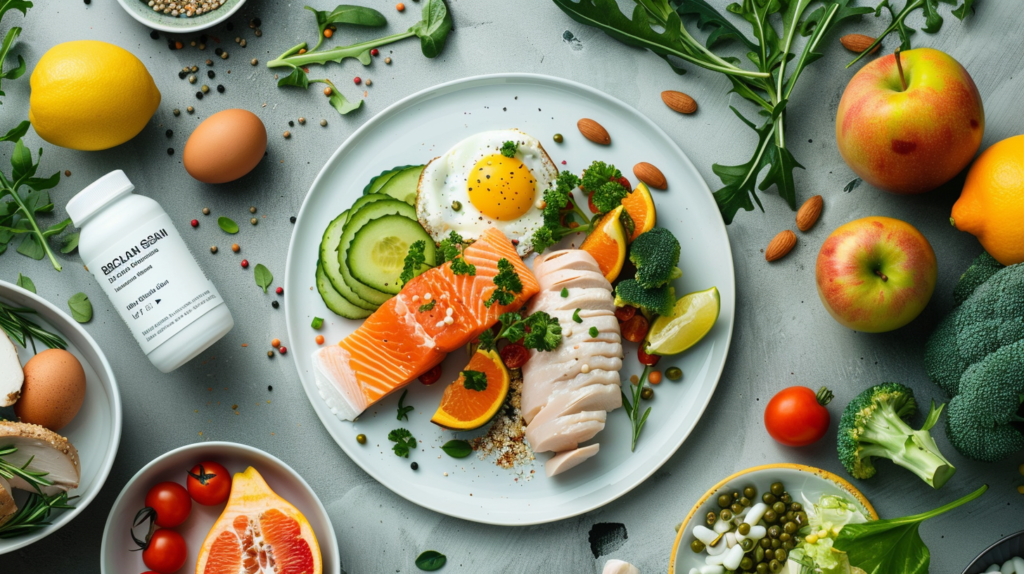
To optimize muscle growth and recovery, one essential element to take into account in muscle-building diets is the inclusion of Branched-Chain Amino Acids (BCAAs). BCAAs consist of three essential amino acids: leucine, isoleucine, and valine. These amino acids are not produced by the body and must be obtained through diet or supplements. BCAAs play a significant role in muscle recovery and athletic performance.
| BCAA | Function |
| Leucine | Stimulates muscle protein synthesis, aiding in muscle growth. |
| Isoleucine | Enhances glucose uptake during exercise, providing energy to muscles. |
| Valine | Assists in maintaining the nitrogen balance in the body for muscle repair. |
BCAAs are particularly beneficial for individuals engaging in intense physical activity, such as weightlifting or endurance training, as they can reduce muscle soreness and fatigue. Studies have shown that BCAAs can also help prevent muscle breakdown during exercise, preserving lean muscle mass. Additionally, BCAAs may improve endurance by reducing perceived exertion, allowing individuals to push harder during workouts. Incorporating BCAAs into your muscle-building diet plan can support overall muscle health, aid in quicker recovery post-workout, and enhance athletic performance. Remember, while BCAAs can be obtained through whole food sources like meat, dairy, and legumes, supplementation can be a convenient way to make sure you are meeting your body’s needs, especially during intense training periods.
Creatine
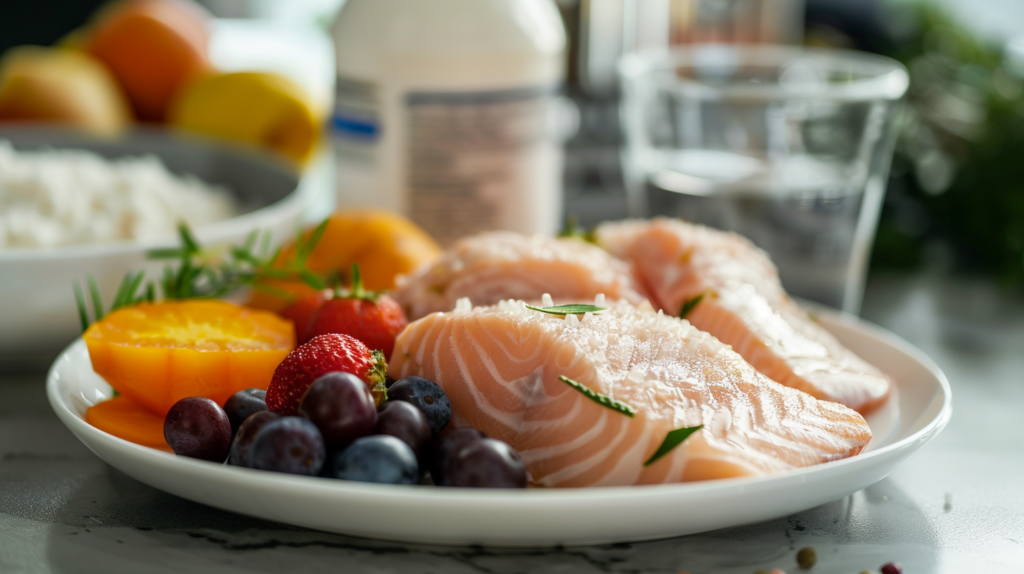
Including creatine in a muscle-building diet has been shown to enhance muscle strength and power output during high-intensity activities. Creatine is a naturally occurring compound that plays a vital role in energy production, particularly during short, explosive movements like weightlifting and sprinting. Creatine supplementation involves taking creatine in supplement form to increase the body’s creatine stores beyond what’s typically obtained through food sources like red meat and fish.
One common method of creatine supplementation is the creatine loading phase, where individuals consume a higher dose of creatine for a short period to saturate their muscles quickly. This loading phase is usually followed by a maintenance phase where a lower dose is taken to sustain elevated creatine levels in the muscles. Research suggests that creatine loading can expedite the benefits of creatine supplementation, leading to faster improvements in strength and power.
Studies have shown that creatine supplementation can increase muscle mass, enhance recovery between sets during exercise, and improve overall exercise performance. Additionally, creatine has been linked to increased muscle hydration, which may contribute to muscle growth and improved exercise capacity. When combined with a structured resistance training program, creatine supplementation can be a valuable tool for individuals looking to maximize their muscle-building potential and performance.
Vitamin D

Vitamin D, an essential nutrient for muscle-building diets, plays a pivotal role in various physiological processes that impact muscle function and overall athletic performance. Adequate levels of vitamin D are vital for muscle growth and strength.
One of the primary ways our bodies obtain vitamin D is through sunlight exposure. When our skin is exposed to sunlight, it triggers the production of vitamin D. This is why spending time outdoors can be beneficial for athletes looking to maximize their muscle-building potential.
In addition to sunlight exposure, dietary sources of vitamin D also play a significant role in ensuring ideal levels of this essential nutrient. Foods such as fatty fish (like salmon and mackerel), fortified dairy products, and egg yolks are good sources of vitamin D. Ensuring a well-rounded diet that incorporates these sources can help support muscle growth and repair.
Moreover, vitamin D absorption is closely linked to other nutrients like calcium and magnesium. These minerals work synergistically to support bone health, which is vital for overall muscle function and strength. Ensuring adequate intake of these minerals alongside vitamin D can have a positive impact on athletic performance and muscle-building efforts.
Iron
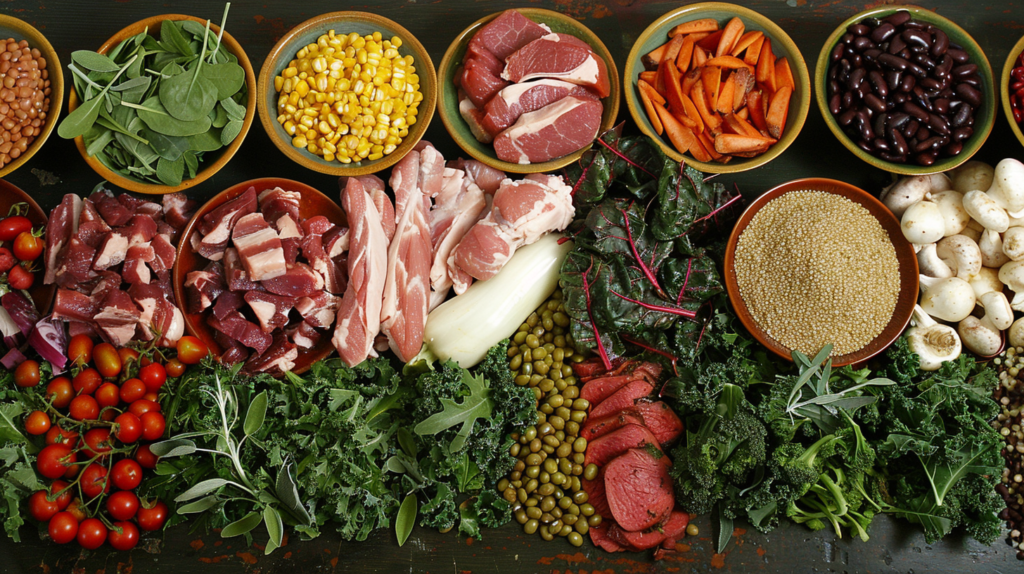
Iron, an essential mineral for muscle-building diets, plays a pivotal role in oxygen transport within the body, necessary for enhancing athletic performance and muscle function. When considering dietary sources of iron, it’s important to include both heme and non-heme iron. Heme iron, found in animal products like lean meats and poultry, is more readily absorbed by the body compared to non-heme iron, which is present in plant-based sources such as lentils, beans, and fortified cereals.
The absorption rates of iron can vary depending on factors such as the individual’s current iron levels, the form of iron consumed, and other dietary components. To improve iron absorption, it’s beneficial to pair iron-rich foods with sources of vitamin C, like citrus fruits or bell peppers. On the other hand, certain substances like tannins in tea or phytates in whole grains can inhibit iron absorption. Cooking in cast-iron cookware can also boost iron intake, particularly when preparing acidic foods.
For individuals following muscle-building diets, ensuring an adequate intake of iron is essential for overall performance and recovery. Monitoring iron levels through blood tests and adjusting dietary choices accordingly can help prevent deficiencies that may impact muscle strength and endurance. By incorporating a variety of iron-rich foods and maximizing absorption rates, individuals can support their muscle-building goals and maintain peak athletic function.
Zinc
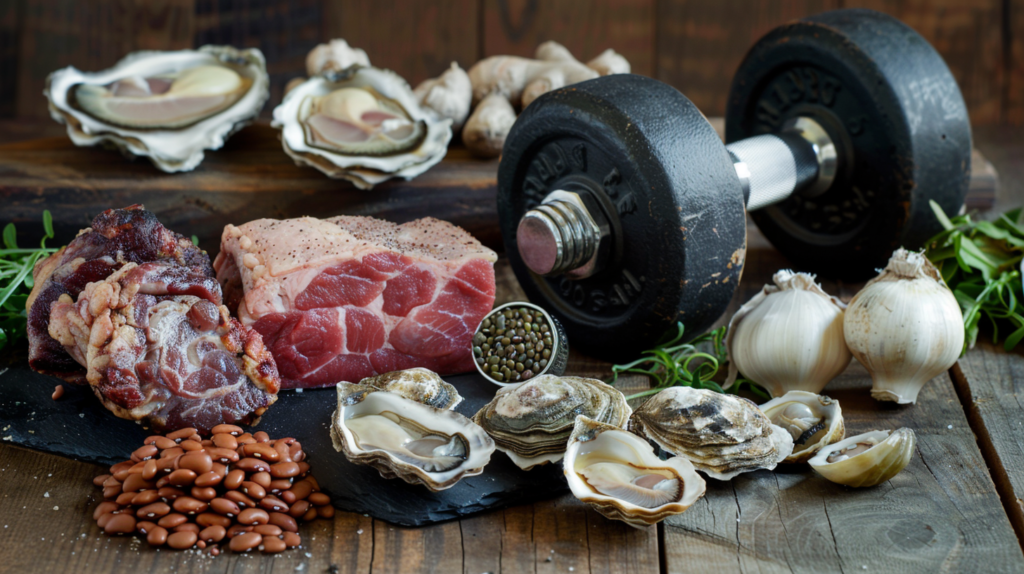
What role does zinc play in supporting muscle-building diets, and how does it contribute to overall athletic performance and recovery? Zinc is an important mineral that supports various functions in the body, including muscle growth and repair. When it comes to muscle-building diet plans, ensuring an adequate intake of zinc is key for best results. Zinc plays a significant role in protein synthesis, which is necessary for muscle recovery and growth after exercise. Additionally, zinc is involved in maintaining a healthy immune system, which is beneficial for overall well-being and performance during intense training periods.
When considering zinc supplementation or looking for zinc-rich foods to support muscle growth, it’s crucial to include a variety of options in your diet. Here is a table highlighting some zinc-rich foods that can be beneficial for musclebuilding diets:
| Foods | Zinc Content (per 100g) | Benefits |
| Pumpkin Seeds | 7.64mg | Rich in antioxidants and fiber, supports immune function and muscle repair |
| Beef | 7.87mg | Excellent source of high-quality protein and iron, crucial for muscle growth |
| Chickpeas | 2.59mg | High in fiber and protein, supports muscle recovery and provides sustained energy |
| Greek Yogurt | 1.02mg | Good source of calcium and probiotics, beneficial for muscle maintenance |
Incorporating these zinc-rich foods into your muscle-building diet can help support your athletic performance and recovery, ensuring you have the necessary nutrients for best muscle growth and repair.
Magnesium
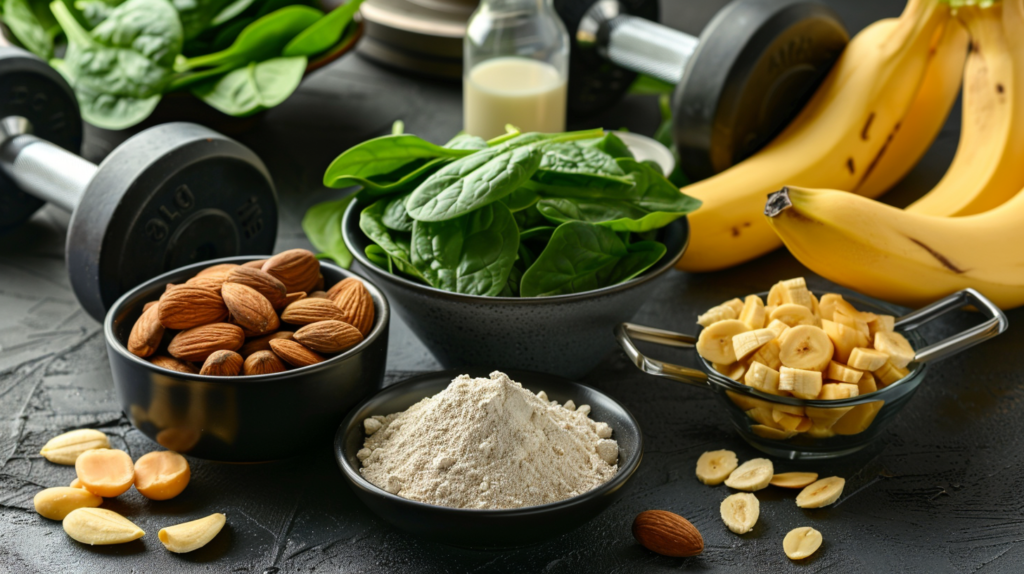
Zinc’s role in supporting muscle-building diets highlights the importance of exploring the impact of magnesium on athletic performance and recovery. Magnesium is an essential mineral that plays a key role in muscle recovery and energy metabolism. When it comes to muscle recovery, magnesium aids in protein synthesis, the process by which muscles repair and grow after exercise. Additionally, magnesium helps regulate muscle contractions and relaxations, reducing the risk of cramps and muscle fatigue during workouts.
In terms of energy metabolism, magnesium is necessary for converting food into energy. It plays a significant role in ATP (adenosine triphosphate) production, the primary energy currency of our cells. Adequate magnesium levels can enhance athletic performance by improving exercise efficiency and endurance. Research suggests that magnesium supplementation may also help reduce inflammation and oxidative stress post-exercise, promoting faster recovery times.
To make sure you’re getting enough magnesium in your muscle-building diet, focus on consuming magnesium-rich foods such as nuts, seeds, leafy green vegetables, whole grains, and legumes. If needed, magnesium supplements can also be considered, especially for athletes engaged in intense training regimens. By prioritizing magnesium intake, you can support your muscle-building goals and overall athletic performance.
Water
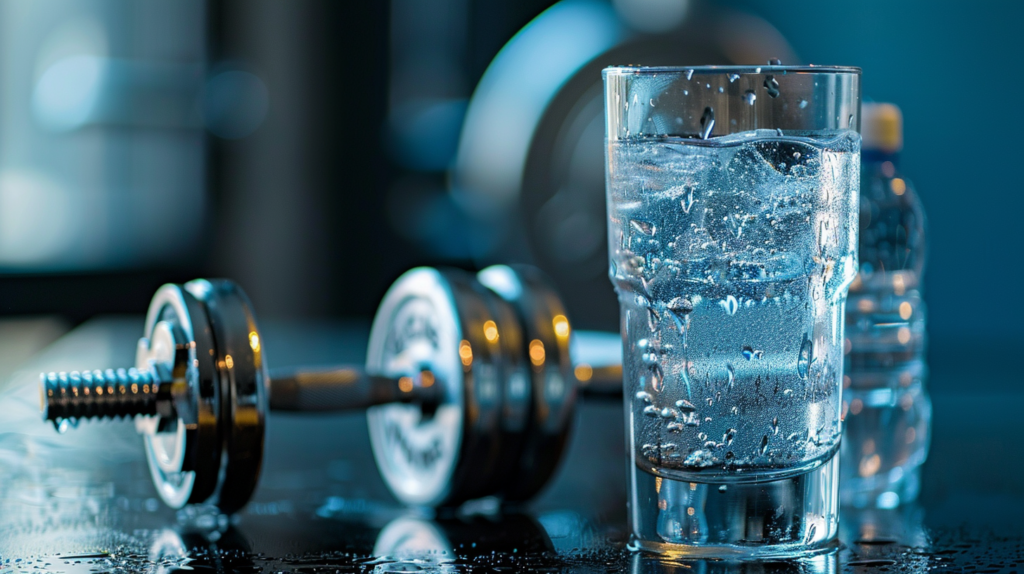
Water, an essential component for overall health and athletic performance, is often overlooked but plays a pivotal role in muscle-building diets.
Hydration is critical for muscle function and overall performance. Staying properly hydrated helps regulate body temperature, transport nutrients, and remove waste products. Dehydration can lead to decreased strength, endurance, and focus during workouts, hindering muscle growth and recovery.
For individuals following muscle-building diet plans, adequate water intake is key. Recommendations vary, but a general guideline is to consume around 3.7 liters (125 ounces) for men and 2.7 liters (91 ounces) for women per day, including water from food sources. However, those engaging in intense physical activity may need more to compensate for fluid loss through sweat.
Proper hydration not only impacts performance but also aids in muscle recovery. Water is essential for nutrient absorption and protein synthesis, key processes for muscle repair and growth. During exercise, muscles are broken down, and water helps transport amino acids and other nutrients to facilitate repair and rebuilding.
Frequently Asked Questions
How Can Meal Timing Impact Muscle Building?
We think meal timing plays a vital role in muscle building. Pre-workout nutrition provides energy, while post-workout nutrition aids recovery. Fasting may impact muscle growth negatively. Ideal nutrient timing around workouts can maximize muscle protein synthesis and overall gains.
Are There Any Specific Foods to Avoid for Muscle Growth?
Avoiding foods that trigger food sensitivities can support digestive health and muscle growth. By identifying and eliminating these triggers, we optimize our body’s ability to absorb essential nutrients, aiding in musclebuilding and overall well-being.
Can Supplements Replace Whole Food Sources of Nutrients?
Supplements can enhance nutrient intake, but whole foods provide a broader spectrum of essential nutrients. While supplements can be effective, they may not always replicate the benefits of whole foods due to differences in nutrient absorption and bioavailability.
What Role Do Hormones Play in Muscle Development?
Hormonal balance is essential for muscle growth. Hormone fluctuations impact muscle repair. Understanding this interplay is key to optimizing muscle development. Research shows that hormones regulate muscle protein synthesis, influencing overall muscle-building potential.
Is It Necessary to Adjust Nutrient Intake During Rest Days?
During rest days, adjusting nutrient intake is essential for muscle recovery. Ideal protein intake and specific recovery nutrition help muscles repair and grow. Adequate rest day nutrition supports overall muscle development and performance.
Conclusion
To wrap up, ensuring you have the right nutrients in your muscle-building diet plan is vital for maximizing your gains and overall performance.
From protein for muscle repair to carbohydrates for energy, each nutrient plays a key role in helping you reach your fitness goals.
Stay tuned for our next article where we explore further specific meal plans and recipes to help you optimize your muscle-building journey.
Stay fueled, stay strong, and keep pushing towards your goals!


